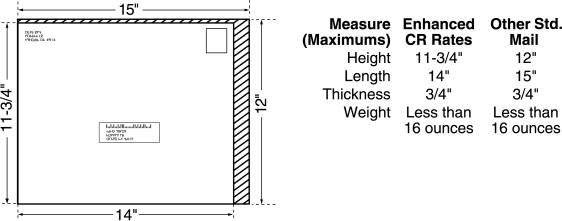 |
 |
C600 Standard Mail
Summary
C600 describes the basic dimension standards and weight limits for Standard Mail.
1.0 Dimensions
1.1Basic Standards
[8-10-03] These standards apply to Standard Mail:
a. Each piece must weigh less than 16 ounces. Lower limits apply to pieces mailing at automation rates.
b. Presorted rate and Customized MarketMail pieces are subject only to the basic mailability standards in C010.
c. ECR pieces mailed at high-density and saturation letter rates must meet the standards for automation-compatible mail in C810 and barcoding in C840.
d. Automation rate pieces are subject to the size and weight limits in C810 (letters) or C820 (flats).
e. Except for automation basic carrier route rate pieces and merchandise samples mailed with detached address labels (DALs), the maximum size for Enhanced Carrier Route Standard Mail is 14 inches long, 11-3/4 inches high, and 3/4 inch thick (see Exhibit 1.1e). Merchandise samples whose dimensions exceed these maximums may be sent at the Enhanced Carrier Route rates if mailed using DALs, provided that the samples meet all other applicable standards and the DALs meet the standards in A060.
Exhibit 1.1eMaximum Dimensions for Standard Mail
Flats

1.2Cover Page and Protective Cover
If the piece is not completely enclosed in a mailing wrapper, then any protective cover or cover page must cover both the front and back of the host publication and extend to within at least 3/4 inch of the edge opposite the fold or binding. Exception: Flat-size pieces may have short covers as provided in C820.6.2.
2.0 [8-10-03] CUSTOMIZED MARKETMAIL
Mailpieces prepared as Customized MarketMail (CMM) under E660 must meet these additional standards and physical characteristics:
a. The material used for constructing the pieces must be free of sharp edges, protrusions, and other design elements that could cause harm or injury to USPS personnel handling these pieces.
b. The dimensions of the pieces must not be smaller than the minimum dimensions for letter-size mail in C050 or greater than the maximum dimensions for flat-size mail in C050. Length and height are defined as follows:
(1) The length and the axis of length are determined by drawing a straight line between the two outer points most distant from each other.
(2) The height is determined by drawing perpendicular lines to the points that are the greatest distance above and below the axis of length. The sum of these two lines defines the height.
c. The maximum weight may not exceed 3.3 ounces.
d. Pieces may be rectangular or nonrectangular, may be uniform or nonuniform in thickness, and may include die cuts, holes, and voids.
e. Pieces must be flexible enough to fit inside a minimum-size mail receptacle measuring 4-7/8 inches wide, 14-7/8 inches high, and 5-7/8 inches long (deep).
f. Design approval by the district business mail entry manager is not required, but it is recommended.
3.0 [8-10-03] Residual Shape Surcharge
Mail that is prepared as a parcel or is not letter-size or flat-size as defined in C050 is subject to a residual shape surcharge. Mail that is prepared as Customized MarketMail under E660 is subject also to the residual shape surcharge. There are different surcharges for Presorted rate pieces and Enhanced Carrier Route rate pieces. Only the surcharges for Presorted rate pieces apply to CMM pieces.
4.0 [8-10-03] Nonmachinable Pieces
4.1Surcharge Applied
The nonmachinable surcharge in R600 applies only to Regular and Nonprofit Standard Mail letter-size pieces (including card-size pieces), except for letter-size pieces prepared and entered as Customized MarketMail under E660, if the pieces weigh 3.3 ounces or less, are claimed at Presorted letter rates, and are subject to either of these conditions:
a. The pieces have one or more of the nonmachinable characteristics for letter-size mail in C050.
b. The pieces are labeled for manual processing by the mailer under the manual only option in M610.
4.2Surcharge Not Applied
The nonmachinable surcharge in R600 does not apply to Standard Mail pieces (including parcels) that are claimed at any nonletter rate. The surcharge also does not apply to Standard Mail letter-size pieces that are claimed at these letter rates:
a. Automation rates.
b. Enhanced Carrier Route rates.
c. Presorted rates if the pieces are not subject to either of the two conditions in 4.1, or if the pieces are prepared and entered as Customized MarketMail under E660.
5.0 Postal Inspection
Standard Mail is not sealed against postal inspection. Standard Mail may be prepared for automated processing but must allow easy examination.
6.0 Enclosures
Envelopes and cards enclosed in automation Standard Mail are subject to the corresponding standards in C810.
DMM Issue 58 (8-10-03)